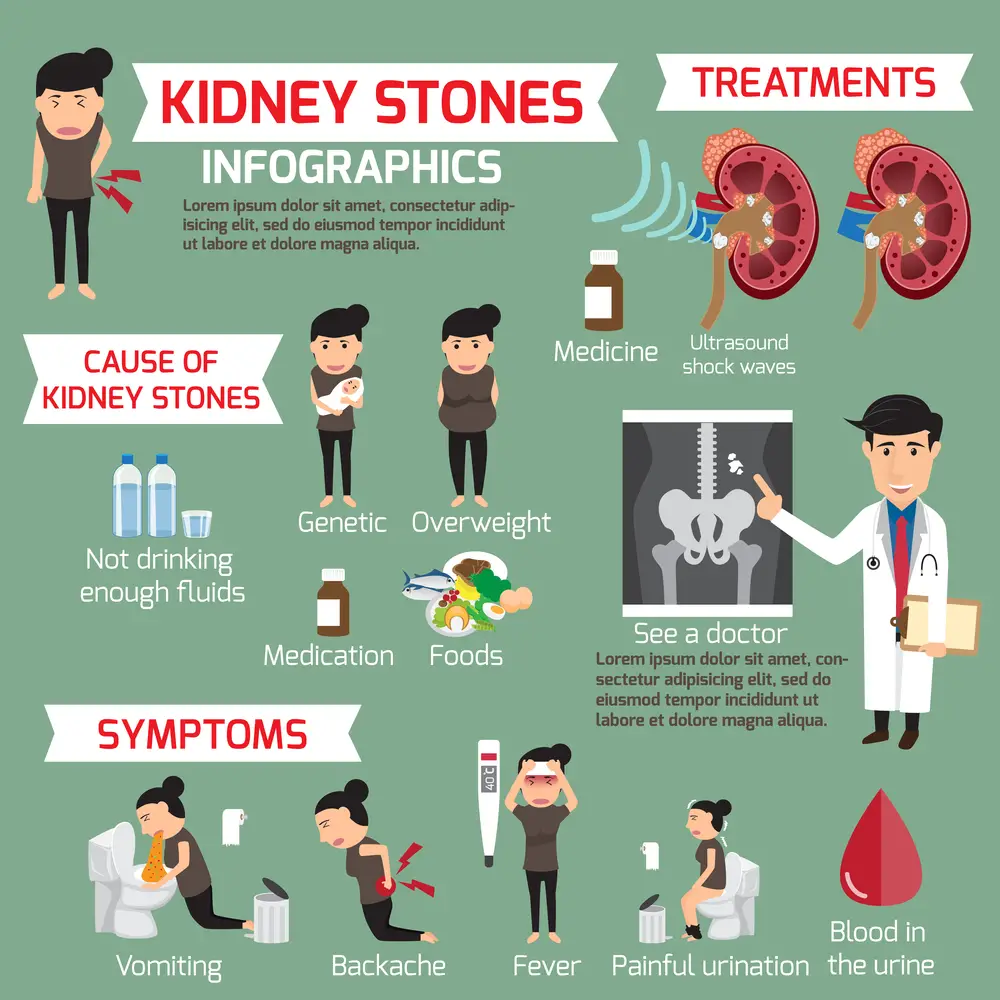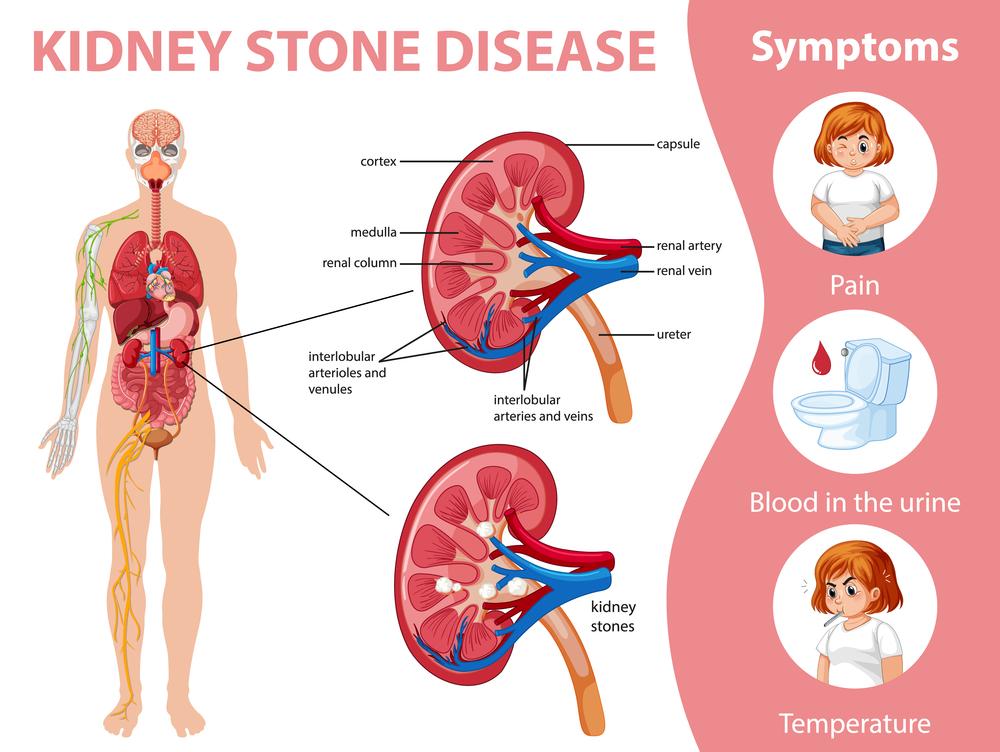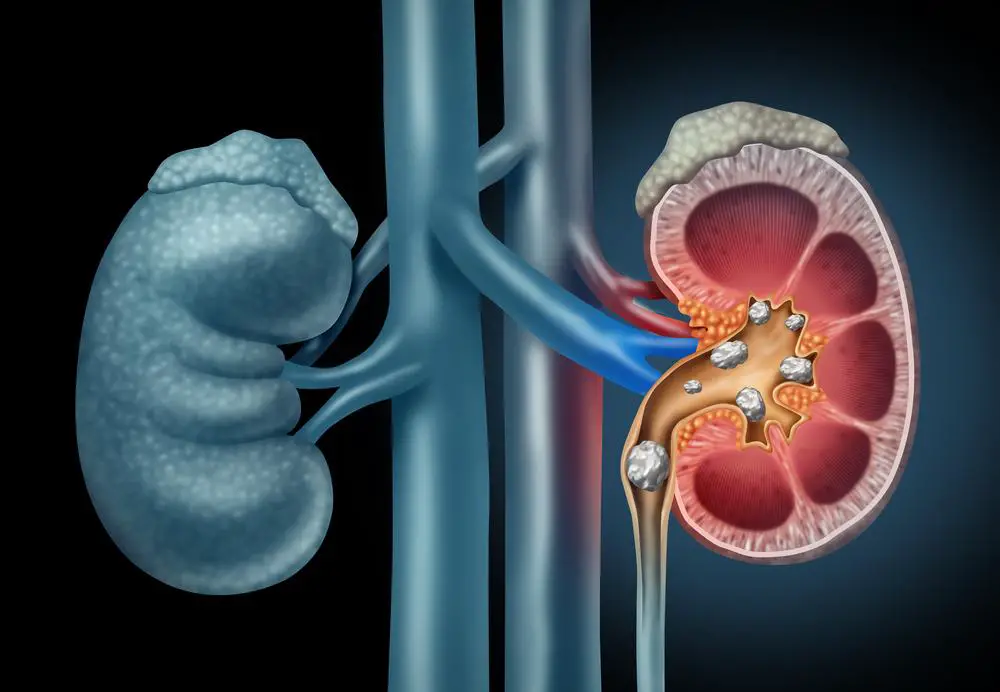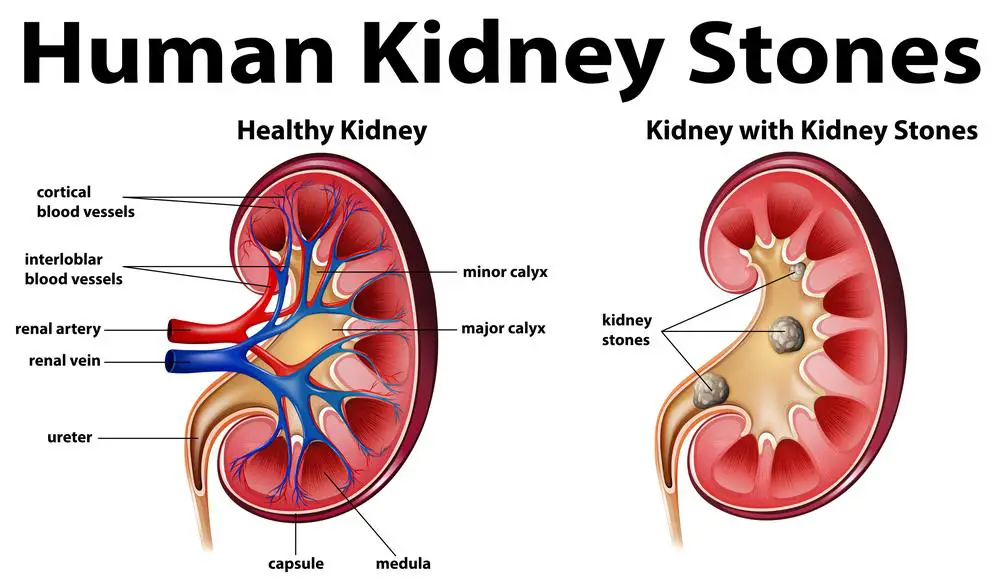As a BetterHelp affiliate, we receive compensation from BetterHelp if you purchase products or services through the links provided
Stress is a common factor that can impact our overall health, including our kidneys. The question arises: can stress cause kidney stones? While stress alone may not directly cause kidney stones, it can contribute to their formation in various ways. When our bodies are under stress, they produce hormones like adrenocorticotrophic hormone (ACTH) and parathyroid hormone (PTH). These hormones can change the chemistry of our urine, leading to a higher risk of kidney stone formation.
On top of hormonal changes, stress can lead to other factors that indirectly affect our kidneys, such as high blood pressure and blood sugar. These factors can burden our kidneys, negatively affecting their blood circulation and function. Therefore, it’s essential to recognize the role of stress in kidney health and find ways to prevent and manage it to reduce the risk of kidney stones.
Key Takeaways
- Stress contributes to kidney stone formation by affecting hormone levels and urine chemistry.
- High blood pressure and high blood sugar, which can be stress-related, burden our kidneys.
- Managing stress and adopting preventive measures can help reduce the risk of kidney stones.
 Understanding the Connection Between Stress and Kidney Stones
Understanding the Connection Between Stress and Kidney Stones
You might be surprised to learn that stress can play a role in the formation of kidney stones. But how do these two seemingly unrelated factors come together? Let’s look at the relationship between chronic and acute stress and the development of these painful mineral deposits in your kidneys.
When you are under stress, your body has a natural response: it releases stress hormones like cortisol and vasopressin. These hormones help regulate your body’s essential functions and enable you to cope with difficult situations. However, when you are under constant stress, these hormones can lead to some unintentional consequences in your body.
One of the effects of increased cortisol levels is the increased excretion of calcium in your urine. When there’s a higher concentration of calcium in your urine, the risk of forming kidney stones can rise as well. On the other hand, the hormone vasopressin has the opposite effect— it can cause water retention, leading to less diluted urine, which can create an environment conducive for kidney stones to form.
Here are some tips to manage stress and decrease your risk of developing kidney stones:
- Try mindfulness meditation, which helps focus your mind on the present moment and can reduce stress levels.
- Exercise regularly, as physical activity, has been shown to relieve stress and decrease the risk of kidney stones.
- Maintain a balanced diet that includes plenty of water and limits foods high in oxalate and sodium, which can promote kidney stone formation.
By following these suggestions and focusing on stress reduction, you can create a healthier environment in your body and lower your risk of developing kidney stones. Remember, a balanced and stress-free life is key to maintaining overall health and happiness.

Biology of Kidney Stones
When it comes to kidney stones, understanding how they form is essential. Kidney stones are solid masses made up of tiny crystals. These crystals can comprise various minerals, including calcium, oxalate, uric acid, cystine, and struvite stones. Let’s take a closer look at the biology of kidney stones and how these different types form.
Your kidneys play a crucial role in filtering waste products from your body. They pass these waste products and excess minerals and fluid into your urine. Most of the time, your urine contains substances that prevent crystals from forming, but sometimes, the balance of these minerals can get disrupted. This can lead to the formation of kidney stones.
First, let’s talk about calcium stones, the most common type. Calcium stones can be further broken down into calcium oxalate and calcium phosphate. Your diet and certain medical conditions can cause high levels of calcium or oxalate in your urine, making calcium stones more likely to form. Meanwhile, uric acid stones develop when the urine is too acidic, often due to consuming a high-protein diet or having certain genetic factors.
Now, onto cystine stones. These originate from a rare genetic disorder called cystinuria, causing the amino acid cystine to leak into your urine. The high cystine levels in the urine eventually drive the formation of these stones.
Lastly, let’s consider struvite stones—from urinary tract infections, from bacteria-producing ammonia that eventually crystallizes. Struvite stones can increase and cause sudden, severe pain.
It’s crucial to pinpoint the underlying cause of your kidney stones, as different treatments and prevention strategies may be needed. Remember, a deeper understanding of what triggers the development of kidney stones will help you take the necessary steps to reduce your risk of experiencing them.

Influencing Factors and Causes
Several factors can contribute to the formation of kidney stones. One of these factors is stress. While it’s not a direct cause, stress can indirectly affect kidney stone formation.
A poor diet consisting of high animal protein, red meat, shellfish, and excessive sodium intake can elevate the risk of kidney stones. Foods high in oxalate, such as spinach, rhubarb, and even caffeine, can also form calcium oxalate stones.
Another critical factor is dehydration. A lack of adequate water intake can cause urine to become more concentrated, increasing the likelihood of stone formation. Ensure you drink enough water throughout the day, especially in hot weather or when exercising.
Various medical conditions can also contribute to kidney stones. Diabetes and high blood pressure are associated with a higher risk. Other related conditions include gout, renal tubular acidosis, inflammatory bowel disease, and cystic kidney disease. If you have a family history of these conditions, managing them and following your healthcare provider’s advice is essential.
Hormones play a significant role as well. Hyperparathyroidism, a hormonal imbalance, can cause an increase in calcium levels in urine, leading to kidney stones. It’s essential to monitor and maintain hormonal balance through medication or other treatments as recommended by your healthcare provider.
Genetic factors can’t be ignored, either. A family history of kidney stones makes you more prone to developing them. So, be extra cautious and adopt a healthy lifestyle to minimize the risks.
When it comes to gender, men are more likely to develop kidney stones than women. However, both genders can benefit from a healthy lifestyle and reducing potential risk factors.
Obesity and weight gain can also increase the risk of kidney stones. Maintaining a healthy weight and engaging in regular physical activity can help you keep stones at bay.
Finally, don’t underestimate the importance of sleep. Sleep patterns and quality significantly affect your overall health, including the risk of developing kidney stones. Get a good night’s sleep and practice good sleep hygiene to reduce the risk further.
In summary, while stress may not directly cause kidney stones, it can indirectly contribute through its effects on other risk factors and lifestyle behaviors. Adopting a healthy lifestyle and managing these other factors can minimize your risk of kidney stones and maintain overall well-being.
Types and Symptoms of Kidney Stones
Kidney stones can be pretty troublesome, and knowing the different types and symptoms is essential to identify if you’re affected. In this section, we’ll cover the main types of kidney stones and their associated symptoms so you can better understand what you might be dealing with.
There are four primary types of kidney stones:
- Calcium stones: These are the most common and are usually composed of calcium oxalate or calcium phosphate.
- Uric acid stones: These stones form when there’s too much uric acid in your urine, and they are more common in people who have a high-protein diet or suffer from gout.
- Struvite stones: Also known as triple phosphate or magnesium ammonium phosphate stones, struvite stones often result from urinary tract infections.
- Cystine stones: Cystine stones are rare and occur in individuals with a hereditary disorder called cystinuria, which causes cystine to leak into the urine and create stones.
Now that we’ve covered the types of kidney stones let’s discuss some common symptoms you might experience. Not all kidney stones cause symptoms, and some may only become apparent when they cause complications.
- Pain: The most common symptom of kidney stones is renal colic, a sharp, cramping pain that usually starts in the back, belly, or side and can radiate to the groin.
- Fever and chills: If a kidney stone causes a urinary tract infection, you might experience a fever and chills as your body tries to fight off the infection.
- Vomiting and nausea: The pain caused by kidney stones can sometimes lead to vomiting and nausea.
- Blood in the urine: Hematuria, or blood in the urine, is a common symptom of kidney stones, and the urine may appear pink, red, or brown.
- Foul-smelling urine: Kidney stones can cause your urine to smell off due to infection or the presence of certain minerals.
- Chronic diarrhea: Some studies suggest a link between chronic diarrhea and an increased risk of developing kidney stones, perhaps due to the loss of water and an imbalance of electrolytes.
In summary, it’s crucial to recognize the various types and symptoms when dealing with kidney stones. If you notice these symptoms, consult your healthcare provider for proper diagnosis and treatment. Be proactive in managing this condition so it doesn’t disrupt your daily life more than necessary.
Prevention Strategies
Taking the right steps to prevent kidney stones is essential, especially if you’re stressed. Remember, prevention is always better than treatment. So, let’s discuss some strategies you can adopt to minimize your risk of developing kidney stones.
Stay Hydrated: One of the most effective ways to prevent kidney stones is to keep your body well-hydrated. Aim to drink enough water every day to maintain clear, pale-yellow urine. This helps dilute the minerals in your urine, reducing the chances of stone formation. Also, consider incorporating other fluids like herbal teas and natural juices in your daily routine to augment your fluid intake.
Stay Active: Engaging in regular physical activity and exercise is beneficial not just for overall health but also for managing stress and kidney stones. Exercise can help reduce anxiety and improve blood circulation, promoting healthy kidney function. Don’t forget to adjust your fluid intake, as you’ll need more water when physically active.
Practice Relaxation Techniques: Chronic stress may contribute to kidney stones, and relaxation techniques like meditation, deep breathing, and yoga can help alleviate stress and support overall kidney health. Integrating these into your daily routine could enhance your well-being and minimize stone formation.
Stay Mindful of Your Diet: Eating a balanced diet with various nutrients prevents kidney stones. Limit salt intake and include calcium-rich foods like leafy greens, dairy products, and fish. Refrain from consuming excessive animal protein, possibly contributing to stone formation.
Seek Professional Help: Consult a urologist or a specialist in urology if you’re concerned about kidney stones or need individualized guidance. They can help devise a specific prevention plan for your needs and monitor your progress.
Here are some key takeaways for you:
- Keep yourself hydrated by drinking sufficient fluids daily.
- Stay active through regular exercise and physical activity.
- Embrace relaxation techniques such as meditation, deep breathing, and yoga to combat stress.
- Eat a balanced diet low in salt and animal protein rich in calcium.
- Consult a urologist or urology specialist for personalized advice.
Remember, taking small steps can make a significant difference in preventing kidney stones and maintaining kidney health. Your body will thank you for it!
Role of Medications and Diet
Taking care of your kidneys and managing kidney stones starts with understanding the role of medications and diet. So, let’s dive into some important aspects of these factors.
Firstly, certain medications, such as diuretics or calcium-based antacids, can contribute to the formation of kidney stones. Diuretics tend to increase urine production, whereas calcium-based antacids can increase the calcium level in your urine, and both of these factors can promote stone formation. If prescribed these medications, discuss the potential risks with your healthcare provider and, if necessary, explore alternatives.
Regarding diet, what you eat and drink can significantly impact kidney stone formation. Consuming a well-balanced diet that includes lots of fruits and vegetables while limiting your intake of animal proteins and sodium is crucial. Steer clear of consuming excessive amounts of tea, as it can contribute to kidney stone formation due to its high oxalate content.
Now, let’s talk about calcium and oxalate. These naturally occurring elements can combine in the body to form kidney stones. Strive to maintain a balanced calcium intake, as too little calcium in your diet can increase the risk of stones. As for oxalate, it’s essential to consume foods that are low in oxalate, such as bananas, cabbage, and avocados, to reduce the risk of stone formation.
Staying well-hydrated is key when it comes to preventing kidney stones. Ensure you drink enough fluids daily—your urine should be pale yellow. Drinking plenty of water and fluids helps dilute the substances in your urine that can form kidney stones.
Remember to:
- Be cautious with medications that can contribute to kidney stones, such as diuretics and calcium-based antacids
- Follow a well-balanced diet, limit your intake of tea, sodium, and animal proteins
- Maintain a balanced intake of calcium and opt for foods low in oxalate
- Keep yourself well-hydrated by drinking enough fluids every day
By keeping these tips in mind and using them to guide your dietary and medication choices, you can positively influence your kidney health and significantly reduce the risk of kidney stones.
Diagnosis and Treatment
When you suspect kidney stones, it’s crucial to consult with a doctor to receive an accurate diagnosis and the appropriate treatment. To confirm the presence of kidney stones, your doctor may order blood tests, which can reveal high calcium or uric acid levels in your blood. These tests also help monitor the health of your kidneys.
Additionally, urinary tract infections (UTIs) may present symptoms similar to kidney stones, so it’s vital to rule them out. UTI symptoms include pain during urination, a frequent urge to urinate, and cloudy, strong-smelling urine. Your doctor may also order a urinalysis to check for UTIs and other issues.
If kidney stones are confirmed, your doctor may recommend various treatment options depending on the size and location of the stones. Your doctor might suggest conservative management for smaller stones, such as drinking plenty of water to help pass the stone and taking pain relievers to ease discomfort.
In some cases, more invasive interventions may be necessary, such as ureteroscopy. This procedure involves inserting a thin tube with a camera and tools, called a ureteroscope, through the urethra and bladder to locate and remove the kidney stone. For larger stones, your doctor might suggest extracorporeal shock wave lithotripsy (ESWL), which uses sound waves to break the kidney stone into smaller pieces that can be passed more easily.
To reduce your risk of developing kidney stones and related complications, make lifestyle changes like drinking plenty of water, limiting sodium intake, and managing stress.
Key Takeaway: If you suspect kidney stones, consult with a doctor to receive a proper diagnosis and treatment plan. Treatment options range from conservative management to procedures like ureteroscopy and ESWL.
 When to See a Therapist for Stress
When to See a Therapist for Stress
- Persistent Overwhelm: Discuss how feeling constantly overwhelmed and unable to cope with everyday tasks can be a sign to seek help.
- Physical Symptoms: Outline physical symptoms of stress that warrant a doctor’s visit, like unexplained headaches, digestive issues, or chronic fatigue.
- Mental Health Concerns: Highlight the importance of consulting a doctor if stress leads to anxiety, depression, or other mental health issues.
- Impact on Daily Life: Emphasize seeking professional help if stress significantly impacts work, relationships, or daily activities.
When to See a Doctor for a Kidney Stone
- Severe Pain: Explain that intense pain in the back, side, lower abdomen, or groin can indicate a kidney stone needing medical attention.
- Trouble Urinating: Describe symptoms like pain during urination, an urgent need to urinate, or urinating more often than usual.
- Visible Changes in Urine: Advise readers to look out for blood in urine, cloudy or foul-smelling urine.
- Other Symptoms: List other symptoms like nausea, vomiting, fever, and chills, indicating the stone might be causing an infection or other complications.
Recognizing the Seriousness
- Understanding the Signs: Offer tips on recognizing when symptoms have crossed into serious territory for stress and kidney stones.
- Taking Action: Encourage readers to trust their instincts and seek medical attention when symptoms feel severe or abnormal.
- Preventative Measures: Briefly mention lifestyle changes or habits that can help manage stress and reduce the risk of kidney stones, promoting overall health and well-being.
Frequently Asked Questions
Can lifestyle factors contribute to kidney stones?
Yes, certain lifestyle factors can contribute to kidney stone development. A sedentary lifestyle, poor hydration, and an unhealthy diet may all increase the risk of kidney stones. Staying active, drinking plenty of water, and adopting a balanced diet will help you maintain good kidney health.
How does anxiety affect kidney health?
Anxiety can indirectly affect kidney health by increasing cortisol levels and causing physiological stress. These changes may contribute to imbalances in your urine chemistry, increasing the likelihood of kidney stone formation. Finding healthy ways to manage anxiety through meditation, exercise, and a balanced diet will support your overall kidney health.
What dietary habits can lead to kidney stones?
High salt consumption, excessive animal protein intake, and a low intake of dietary calcium and magnesium can all increase the risk of kidney stone formation. To reduce your risk, limit your consumption of salty and processed foods, include plant-based protein sources in your diet, and consume adequate calcium and magnesium from natural food sources.
Are certain age groups more prone to kidney stones?
Kidney stones tend to be more common in adults between the ages of 30 and 60. However, that doesn’t mean other age groups are immune to kidney stones. Maintaining a healthy lifestyle, practicing proper hydration, and adopting a balanced diet is essential for all age groups to minimize the risk of kidney stones.
Can emotional stress impact kidney function?
Yes, emotional stress can indirectly impact kidney function by causing hormonal imbalances, which may affect urine chemistry and increase the risk of kidney stone development. Learning healthy coping mechanisms for stress, such as meditation, exercise, or seeking support from friends and family, can help reduce the impact of emotional stress on your kidneys.
Does caffeine intake increase the risk of kidney stones?
Moderate caffeine intake does not typically increase the risk of kidney stones. However, excessive consumption of caffeine may cause dehydration and alter your urine chemistry, raising the risk of kidney stone formation. It’s essential to enjoy caffeine-containing beverages like coffee and tea in moderation and prioritize staying hydrated throughout the day.
About Jacob Maslow
After surviving the traumatizing events of 9/11, I took it upon myself to heal through helping others. I’m the primary caregiver of my children and understand from first-hand experience the lonely paths you have to walk as a partner and parent when leaving an unhealthy relationship.
We’re all echoing in a dark space that doesn’t have to be this empty, and that’s been my mission since finding solace and recovery in therapy: To help comfort others who are still in shock and at the prime of their struggle.
I came across BetterHelp after searching for this type of community. I wanted to belong to a body of proactive therapists and supportive therapy veterans who allowed me to see other sides of the story.
It was unconventional, and that’s what attracted me most. During my most challenging times, when my ex-wife completely cut me off from my children, I found comfort and clarity through BetterHelp.
Instead of being chained to a strict therapist recommendation, I was in charge of who I felt understood my struggle most. That allowed me to find my true peace, as I was reunited with those who read behind my words and had first-hand experience with my trauma.
Recovery is a choice; with BetterHelp, that choice will be a few clicks away. You can join their couples-oriented platform, Regain.us, for those stuck with family estrangement and toxic relationship patterns.
- 7 Ideas to Help You Relax and Unwind on a Family Vacation - April 27, 2025
- How Having Cybersecurity Protection Helps You Relax - April 25, 2025
- 8 Reasons Why Spending Time Outside Calms You Down - April 25, 2025
This site contains affiliate links to products. We will receive a commission for purchases made through these links.


 Understanding the Connection Between Stress and Kidney Stones
Understanding the Connection Between Stress and Kidney Stones When to See a Therapist for Stress
When to See a Therapist for Stress

